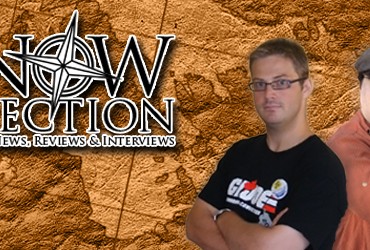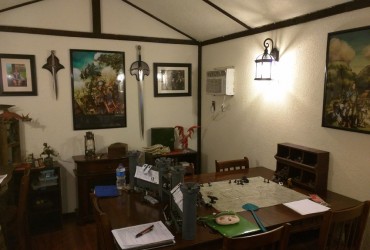Welcome to Guidance, Private Sanctuary’s source for tips and techniques for the Pathfinder Roleplaying Game, written by Everyman Gamer Alexander Augunas. Today, we’re going to be talking about occultism and what makes something ‘occult’.
Between Occult Adventures’ announcement and my promoting of my Pact Magic Unbound: Grimoire of Lost Souls Kickstarter (which you should totally check out if you already haven’t), you’ve probably heard the term “occult” tossed around a lot these past few months.
Well, what does “occult” mean and similarly, what does it mean to be “occult?” That’s the main topic of today’s installment of Guidance. So let’s get cracking and get on to it!
Definition of ‘Occult’
Before we begin, I think it’d help for us to have a starting point. Let’s begin with the key to the English language, the dictionary!
According to most English dictionaries, the term “occult” means the following:
Noun
- supernatural, mystical, or magical beliefs, practices, or phenomena.
Adjective
- of, involving, or relating to supernatural, mystical, or magical powers or phenomena.
- paranormal, transcendental
- communicated only to the initiated; esoteric.
- (Medicine) a disease or process not accompanied by readily discernible signs or symptoms.
- (Medicine) blood that is abnormally present, e.g., in feces, but detectable only chemically or microscopically.
Verb
- cut off from view by interposing something.
- (Astronomy) when a celestial body conceals an apparently smaller celestial body from view by passing or being in front of it.
Well, we certainly have some diverse meanings there, huh? When used as a verb, “occult” means to conceal something by placing something else in front of it. For instance, you could say that a bride’s veil occults her face from her husband’s eyes until the wedding ceremony begins. While fascinating, that’s not the definition that we’re looking for.
As a noun, something that’s occult is a mystical, supernatural, or magical system of beliefs, practices, or phenomena. So if I say “That’s religion’s occult,” I’m saying that its based on supernatural or magical beliefs. Ultimately, this definition doesn’t help us. In the Pathfinder Roleplaying Game, you could literally call virtually every religion occult because they involve a magical system of beliefs or practices, aka “praying for spells” or “adhering to a patron.”
When we as gamers use occult, its typically in adjective form; it modifies something else, such as in Occult Adventures. As an adjective, occult means one of several things: First, it can mean “anything relating to supernatural, mystic, or magical powers.” Under this definition, almost every class in the Pathfinder Roleplaying Game is occult, so obviously this isn’t what it means to be “occult” in the Pathfinder Roleplaying Game. Second, we have paranormal or transcendental. Well, paranormal might be a pretty good fit, but transcendental means “mystical” or “divine,” and again, many classes in the Pathfinder Roleplaying Game could be considered transcendental. Lastly, we have “communicated only to the initiated,” or “esoteric.” The last few definitions we have relate to something that’s hidden in medicine, such as when trace amounts of blood are present, abet hidden from conventional detection or when a disease is present without symptoms.
So how, exactly, do we translate this to the Pathfinder Roleplaying Game?
The REAL Definition
I’ll be honest, those generic definitions were NOT what we were looking for in a definition; I simply wanted to show how conventional uses of the world “occult” don’t mean much in the Pathfinder Roleplaying Game. Instead, here’s a final definition for “occult” as an adjective, taken from Wikipedia’s page on spirituality:
The occult (from the Latin word occultus “clandestine, hidden, secret”) is “knowledge of the hidden”. In common English usage, occult refers to “knowledge of the paranormal”, as opposed to “knowledge of the measurable”, usually referred to as science. The term is sometimes taken to mean knowledge that “is meant only for certain people” or that “must be kept hidden”, but for most practicing occultists it is simply the study of a deeper spiritual reality that extends beyond pure reason and the physical sciences. The terms esoteric and arcane have very similar meanings, and in most contexts the three terms are interchangeable.
So, in a nutshell, something is occult when it is hidden, secret, and beyond physical measurement. This is interesting, because in the real world one might consider all religion as “occult” because we can’t measure or perceive spirituality. But in Pathfinder, where the gods ARE perceivable thanks to their willingness to grant magical powers to worshipers, the gods aren’t really occult figures. A cleric knows roughly how many spells she is able to prepare each day, and unlike occultism, a cleric is tasked with spreading knowledge of her deity in most cases, not keeping it a secret. True occultism, on the other hand, is something must be kept secret for one reason or another.
With this in mind, we can come up with a few key points:
- For something to be truly ‘occult,’ there should be few to no ways to train in it. The occult is secret and for the select few; to others, it should remain mysterious. As a result, you’ll likely see few occult schools or universities. Everything should be kept clandestine.
- Occultism is based on things that aren’t entirely measurable or definable. Occultists, therefore, are willing to cast their lot in with unseen and unknown forces.
- Occultism never relies on measurable science.
Pact Magic and the Occult
Under this definition, the system of pact magic found in Radiance House’s Pact Magic series works exceptionally well. Everything from the flavor to the mechanics is drenched with the idea that pact magic is not for everyone, that it is something secret and terrible and wonderful all at once. Here are some key points.
- Pact Magic is usually based on Charisma, not Intelligence. Charisma is the innermost sense of self, which is idolized in most occult works. Intelligence is the logical, thinking, reasoning portion of the mind and Wisdom commonly represents the five senses, all of which have difficulty in truly comprehending the occult.
- The default rules assume that your character doesn’t just magically gain access to new spirits, that he or she must search for them and discover them on his or her own using the Knowledge Task system or by consulting a gnostic tome.
- It is impossible to learn spells with the occult descriptor simply by leveling up unless you possess the bind spirits ability; you have to actually go out of your way and find them in order to learn them from scrolls and the like.
- The core flavor assumes that there are HUGE stigmatisms against pact magic.
- The core flavor assumes that occult communities exist, but they are few and far between.
It becomes easy to see how drenched in the occult pact magic truly is.
Occult Adventures and the Occult
It pains me to say it, but by this definition, I don’t think that the playtest classes that we saw in Occult Adventures capture the flavor of the occult, its “spirit” if you will. There are TONS of on-theme powers and abilities, and the classes look great, but most of them (the spiritualist being a notable exception) lack the sort of clandestine appeal, that ‘forbidden fruit’ aspect that really makes the occult what it ought to be. Looking at all of the classes, I honestly get the impression that research was done and occult historians were consulted, but the overall mystery really isn’t present in the Occult Adventures playtest.
Which, of course, is an excellent time to bring up that the document that we got was JUST A PLAYTEST. Considering that Erik Mona and Brandon Hodge have joined Paizo’s all-star team of designers on Occult Adventures, I have high hopes that the final product IS going to contain all of those elements that make something occult. I’m hoping that we get a good number of subsystems and alternate rules that emphasize this point for all its worth, because its that flavor that is going to determine how successful Occult Adventures is, whether it is a smashing success or just another player power-up book (other people’s words, not mine).
I hope you’ve gotten a good taste of what it means to be ‘occult,’ and I hope I’ve helped pique your interest not only in Paizo’s Occult Adventures, but also in my Pact Magic Unbound: Grimoire of Lost Souls Kickstarter. We’re trying to raise as much money to buy new artwork for our compilation as possible, and if you have a couple of bucks to spare I’d appreciate your support.
Got any questions, comments, or concerns? Leave’em here and I’ll be looking forward to chatting with you soon next time at Guidance!
Alexander “Alex” Augunas has been playing roleplaying games since 2007, which isn’t nearly as long as 90% of his colleagues. Alexander is an active freelancer for the Pathfinder Roleplaying Game and is best known as the author of the Pact Magic Unbound series by Radiance House. Alex is the owner of Everyman Gaming, LLC and is often stylized as the Everyman Gamer in honor of Guidance’s original home. Alex’s favorite color is blue and his favorite Pathfinder Race/Class combination is kitsune mesmerist, because really, who can say “No,” to playing a dapper fox in a cape?







I think…. that occult, as used in Occult Adventures, will refer more to paranormal aspects (interacting with spirits), secret cults, and pacts with otherworldly beings. It’ll probably have quite a bit on things like possessions, haunts and how beings can interfere with the world, but I doubt it will restrict access to the classes in anyway. That’s not what setting neutral rulebooks are for, after all.
For the secretive, hidden aspect of the occult, I would expect that to be touched up on in Golarion specific books.